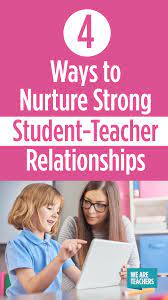Strong student-teacher relationships are the foundation of effective learning and create a supportive educational environment. When students feel comfortable with their teachers, they can communicate openly, ask questions, and engage in exploring complex topics. In this article, we will discuss four steps that can help you build a strong student-teacher relationship.
1. Establish Rapport
Establishing rapport is essential in fostering positive relationships with your students. Begin by sharing some personal information about yourself, such as your interests and hobbies. This will allow your students to relate to you on a human level and encourage them to open up about themselves. Create opportunities for casual conversation before or after class, or during breaks, to learn more about your students and their lives outside the classroom.
2. Set Clear Expectations
Setting clear expectations from day one ensures that both students and teachers understand their roles in the learning process. This includes guidelines for behavior, classroom participation, workload expectations, and grading policies. Make sure to involve your students actively in establishing ground rules for the classroom. This co-creation process will increase their sense of ownership and responsibility towards their education.
3. Encourage Open Communication
Open communication between students and teachers is paramount for trust-building and conflict resolution. Provide multiple channels for students to convey their thoughts, ask questions, or express concerns without fear of being judged or ridiculed – this may include anonymous question boxes, one-on-one meetings, or online platforms.
Practice active listening when addressing student concerns or questions – try to put yourself in the student’s shoes to better understand their perspective. Offer constructive feedback consistently while acknowledging student progress and effort; this will help motivate students to improve further.
4. Show That You Care
Genuine care for your student’s well-being goes a long way in establishing strong relationships. Demonstrating concern for their mental health and personal challenges indicates that you see them as more than just a grade on paper. Offer support and encouragement during difficult times, and celebrate their successes with enthusiasm. Be understanding of individual circumstances and offer flexibility when working with each student.
In conclusion, fostering strong student-teacher relationships is essential for promoting academic success and personal growth among your students. It takes time, effort, and patience but ultimately pays off in the form of a supportive classroom environment conducive to learning. By establishing rapport, setting clear expectations, encouraging open communication, and showing genuine care, you can create lasting connections that help your students reach their full potential.





